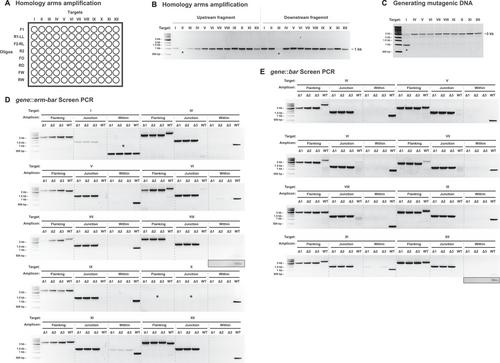{"title":"生成条形码标记的鱼腥弧菌缺失菌株和条形码测序(BarSeq),用于多重菌株竞赛。","authors":"Hector L. Burgos, Mark J. Mandel","doi":"10.1002/cpz1.70024","DOIUrl":null,"url":null,"abstract":"<p><i>Vibrio fischeri</i> is a model mutualist for studying molecular processes affecting microbial colonization of animal hosts. We present a detailed protocol for a barcode sequencing (BarSeq) approach that combines targeted gene deletion with short-read sequencing technology to enable studies of mixed bacterial populations. This protocol includes wet lab steps to plan and produce the deletions, approaches to scale up mutant generation, protocols to prepare and conduct the strain competition, library preparation for sequencing on an Illumina iSeq 100 instrument, and data analysis with the barseq python package. Aspects of this protocol could be readily adapted for tagging wild-type <i>V. fischeri</i> strains with a neutral barcode for examination of population dynamics or BarSeq analyses in other species. © 2024 The Author(s). Current Protocols published by Wiley Periodicals LLC.</p><p><b>Basic Protocol 1</b>: Production of the <i>erm-bar</i> DNA</p><p><b>Basic Protocol 2</b>: Generation of a targeted and barcoded deletion strain of <i>V. fischeri</i></p><p><b>Alternate Protocol</b>: Parallel generation of multiple barcode-tagged <i>V. fischeri</i> deletion strains</p><p><b>Basic Protocol 3</b>: Setting up mixed populations of barcode-tagged strains</p><p><b>Basic Protocol 4</b>: Performing a competitive growth assay</p><p><b>Basic Protocol 5</b>: Amplicon library preparation and equimolar pooling</p><p><b>Basic Protocol 6</b>: Sequencing on Illumina iSeq 100</p><p><b>Basic Protocol 7</b>: BarSeq data analysis</p>","PeriodicalId":93970,"journal":{"name":"Current protocols","volume":"4 10","pages":""},"PeriodicalIF":0.0000,"publicationDate":"2024-10-26","publicationTypes":"Journal Article","fieldsOfStudy":null,"isOpenAccess":false,"openAccessPdf":"https://onlinelibrary.wiley.com/doi/epdf/10.1002/cpz1.70024","citationCount":"0","resultStr":"{\"title\":\"Generation of Barcode-Tagged Vibrio fischeri Deletion Strains and Barcode Sequencing (BarSeq) for Multiplex Strain Competitions\",\"authors\":\"Hector L. Burgos, Mark J. Mandel\",\"doi\":\"10.1002/cpz1.70024\",\"DOIUrl\":null,\"url\":null,\"abstract\":\"<p><i>Vibrio fischeri</i> is a model mutualist for studying molecular processes affecting microbial colonization of animal hosts. We present a detailed protocol for a barcode sequencing (BarSeq) approach that combines targeted gene deletion with short-read sequencing technology to enable studies of mixed bacterial populations. This protocol includes wet lab steps to plan and produce the deletions, approaches to scale up mutant generation, protocols to prepare and conduct the strain competition, library preparation for sequencing on an Illumina iSeq 100 instrument, and data analysis with the barseq python package. Aspects of this protocol could be readily adapted for tagging wild-type <i>V. fischeri</i> strains with a neutral barcode for examination of population dynamics or BarSeq analyses in other species. © 2024 The Author(s). Current Protocols published by Wiley Periodicals LLC.</p><p><b>Basic Protocol 1</b>: Production of the <i>erm-bar</i> DNA</p><p><b>Basic Protocol 2</b>: Generation of a targeted and barcoded deletion strain of <i>V. fischeri</i></p><p><b>Alternate Protocol</b>: Parallel generation of multiple barcode-tagged <i>V. fischeri</i> deletion strains</p><p><b>Basic Protocol 3</b>: Setting up mixed populations of barcode-tagged strains</p><p><b>Basic Protocol 4</b>: Performing a competitive growth assay</p><p><b>Basic Protocol 5</b>: Amplicon library preparation and equimolar pooling</p><p><b>Basic Protocol 6</b>: Sequencing on Illumina iSeq 100</p><p><b>Basic Protocol 7</b>: BarSeq data analysis</p>\",\"PeriodicalId\":93970,\"journal\":{\"name\":\"Current protocols\",\"volume\":\"4 10\",\"pages\":\"\"},\"PeriodicalIF\":0.0000,\"publicationDate\":\"2024-10-26\",\"publicationTypes\":\"Journal Article\",\"fieldsOfStudy\":null,\"isOpenAccess\":false,\"openAccessPdf\":\"https://onlinelibrary.wiley.com/doi/epdf/10.1002/cpz1.70024\",\"citationCount\":\"0\",\"resultStr\":null,\"platform\":\"Semanticscholar\",\"paperid\":null,\"PeriodicalName\":\"Current protocols\",\"FirstCategoryId\":\"1085\",\"ListUrlMain\":\"https://onlinelibrary.wiley.com/doi/10.1002/cpz1.70024\",\"RegionNum\":0,\"RegionCategory\":null,\"ArticlePicture\":[],\"TitleCN\":null,\"AbstractTextCN\":null,\"PMCID\":null,\"EPubDate\":\"\",\"PubModel\":\"\",\"JCR\":\"\",\"JCRName\":\"\",\"Score\":null,\"Total\":0}","platform":"Semanticscholar","paperid":null,"PeriodicalName":"Current protocols","FirstCategoryId":"1085","ListUrlMain":"https://onlinelibrary.wiley.com/doi/10.1002/cpz1.70024","RegionNum":0,"RegionCategory":null,"ArticlePicture":[],"TitleCN":null,"AbstractTextCN":null,"PMCID":null,"EPubDate":"","PubModel":"","JCR":"","JCRName":"","Score":null,"Total":0}
引用次数: 0
Generation of Barcode-Tagged Vibrio fischeri Deletion Strains and Barcode Sequencing (BarSeq) for Multiplex Strain Competitions
Vibrio fischeri is a model mutualist for studying molecular processes affecting microbial colonization of animal hosts. We present a detailed protocol for a barcode sequencing (BarSeq) approach that combines targeted gene deletion with short-read sequencing technology to enable studies of mixed bacterial populations. This protocol includes wet lab steps to plan and produce the deletions, approaches to scale up mutant generation, protocols to prepare and conduct the strain competition, library preparation for sequencing on an Illumina iSeq 100 instrument, and data analysis with the barseq python package. Aspects of this protocol could be readily adapted for tagging wild-type V. fischeri strains with a neutral barcode for examination of population dynamics or BarSeq analyses in other species. © 2024 The Author(s). Current Protocols published by Wiley Periodicals LLC.
Basic Protocol 1: Production of the erm-bar DNA
Basic Protocol 2: Generation of a targeted and barcoded deletion strain of V. fischeri
Alternate Protocol: Parallel generation of multiple barcode-tagged V. fischeri deletion strains
Basic Protocol 3: Setting up mixed populations of barcode-tagged strains
Basic Protocol 4: Performing a competitive growth assay
Basic Protocol 5: Amplicon library preparation and equimolar pooling
Basic Protocol 6: Sequencing on Illumina iSeq 100
Basic Protocol 7: BarSeq data analysis


